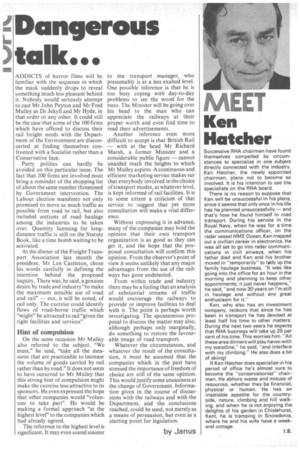Dangerous talk...
Page 52

If you've noticed an error in this article please click here to report it so we can fix it.
ADDICTS of horror films will be familiar with the sequence in which the mask suddenly drops to reveal something much less pleasant behind it. Nobody would seriously attempt to cast Mr John Peyton and Mr Fred Mulley as Dr Jekyll and Mr Hyde, in that order or any other. It could still be the case that some of the 100 firms which have offered to discuss their rail freight needs with the Department of the Environment are disconcerted at finding themselves confronted with a Socialist rather than a Conservative face.
Party politics can hardly be avoided on this particular issue. The fact that 100 firms are involved must bring a reminder of the shopping list of about the same number threatened by Government intervention. The Labour election manifesto not only promised to move as much traffic as possible from road to rail, but also included sections of road haulage among the industries to be taken over. Quantity licensing for longdistance traffic is still on the Statute Book, like a time bomb waiting to be activated.
At the dinner of the Freight Transport Association last month the president, Mr Len Castleton, chose his words carefully in defining the intention behind the proposed inquiry. There was, he said, a genuine desire by trade and industry "to make the maximum sensible use of road and rail" — not, it will be noted, of rail only. The exercise could identify flows of road-borne traffic which "might" be attracted to rail "given the right facilities and services".
Hint of compulsion
On the same occasion Mr Mulley also referred to the subject. "We must," he said, "take all the measures that are practicable to increase the volume of goods carried by rail rather than by road." It does not seem to have occurred to Mr Mulley that this strong hint of compulsion might make the exercise less attractive to its sponsors. He even expressed the hope that other companies would "volunteer to take part". He would be making a formal approach "at the highest level" to the companies which had already agreed.
The reference to the highest level is significant. It may even sound sinister to the transport manager, who presumably is at a less exalted level. One possible inference is that he is too busy coping with day-to-day problems to see the wood for the trees. The Minister will be going over his head to the man who can appreciate the railways at their proper worth and even find time to read their advertisements.
Another inference even more difficult to accept is that British Rail — with at the head Mr Richard Marsh, a former Minister and a considerable public figure — cannot unaided reach the heights to which Mr Mulley aspires. A continuous and efficient marketing service makes sur that everybody involved in the choice of transport modes, at whatever level, is kept informed of rail facilities. It is to some extent a criticism of that service to suggest that yet more consultation will make a vital difference.
Without expressing it in advance, many of the companies may hold the opinion that their own transport organization is as good as they can get it, and the hope that the proposed consultation will confirm this opinion. From the observer's point of view it seems unlikely that any major advantages from the use of the railways has gone undetected.
From within trade and industry there may be a feeling that an analysis of substantial streams of traffic would encourage the railways to provide or improve facilities to deal with it. The point is perhaps worth investigating. The spontaneous proposal to discuss the matter may also, although perhaps only marginally, do something to restore the favourable image of road transport.
Whatever the circumstances, and whatever the result of the consultation, it must be assumed that the companies which in the past have stressed the importance of freedom of choice are still of the same opinion. This would justify some uneasiness at the change of Government. Information given in the course of discussions with the railways and with the Department, and the conclusions reached, could be used, not merely as a means of persuasion, but even as a starting point for legislation.
by Janus








































































































